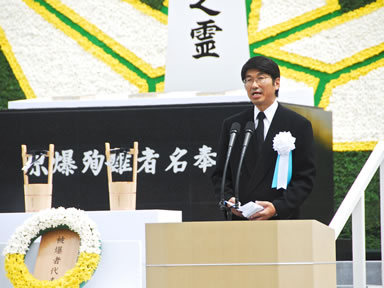We will not forget the atomic cloud that rose into
the sky on that fateful day.
On August 9, 1945 at 11:02 a.m., a single atomic bomb dropped by a United
States military aircraft exploded into an enormous fireball, engulfing the city
of Nagasaki. Unimaginably intense heat rays, blast winds, and radiation; magnificent
cathedral crumbling; charred bodies scattered amongst the ruins; people huddled
in groups, their skin shredded by countless glass fragments, and the stench of
death hung over the atomic wasteland.
Some 74,000 people perished and another 75,000 sustained terrible injuries.
Those who somehow survived the blast suffered from poverty and discrimination,
threatened even today by the physical and psychological damage caused by radiation
exposure.
This year marks the 100th anniversary of the birth of the city of Nagasaki's
first Honorary Citizen, Dr. Takashi Nagai. Despite sustaining injuries in the
atomic blast while at work at Nagasaki Medical College, Dr. Nagai devoted himself
as a physician to the relief of the atomic bombing victims, and broadly conveyed
the horror of the atomic bomb through written works such as The Bells of Nagasaki,
even as he himself continued to suffer "radiation sickness". Dr. Nagai
once said, "There is no winning or losing in war; there is only ruin".
His words transcend time in reminding the world of the preciousness of peace
and continue today to sound a warning to humankind.
The reverberations of a written appeal entitled "Toward a Nuclear-Free
World" are being felt around the world. The authors of this appeal are four
men who promoted nuclear policy under successive American presidents: former
US Secretaries of State Henry Kissinger and George Schultz, former Secretary
of Defense William Perry, and former Senate Armed Services Committee Chairman
Sam Nunn.
These four men now promote their country's ratification of the Comprehensive
Nuclear-Test-Ban Treaty (CTBT) and demand that the U.S. keeps the promises it
agreed to at the Nuclear Non-Proliferation Treaty (NPT) Review Conference, calling
for the leaders of all the countries in possession of nuclear weapons to work
intensively to reduce nuclear weapons with the common aim of creating a world
without nuclear weapons.
These appeals mirror those that we have been making repeatedly in Nagasaki
- the city that suffered the fate of an atomic bomb.
We made even stronger demands to the nuclear-weapon states. First of all,
the U.S. and Russia must take the lead in striving to abolish nuclear weapons.
These two countries, which together are said to possess 95% of the world's nuclear
warheads, should begin implementing broad reductions of nuclear weapons instead
of deepening their conflict over, among others, the introduction of a missile-defense
system in Europe. The United Kingdom, France, and China should also fulfill their
responsibility to reduce nuclear arms with sincerity.
We also demand that the United Nations and international society do not ignore
the nuclear weapons of North Korea, Pakistan, and Israel, as well as the suspicions
of nuclear development by Iran, but take stern measures against these countries.
Furthermore, India, whose nuclear cooperation with the U.S. is a cause of concern,
should be strongly urged to join the NPT and CTBT.
Japan, as a nation that has experienced nuclear devastation, has a mission
and a duty to take a leadership role in the elimination of nuclear weapons. To
ensure the denuclearization of the Korean Peninsula, the Japanese Government
must cooperate with international society to forcefully demand that North Korea
completely destroys its nuclear arsenal. Moreover, based on the ideals of peace
and renunciation of war prescribed in the Japanese Constitution, the Japanese
government should realize the enactment of the Three Non-Nuclear Principles into
law and seriously consider the creation of a "Northeast Asian Nuclear Weapon-Free
Zone".
In Nagasaki elderly victims of the atomic bombing tell the story of their
experiences even as they continue to endure physical and psychological pain,
while young people continue to present petitions calling for the abolishment
of nuclear weapons to the United Nations under the slogan of "humble but
not helpless". As guides for peace, the citizens of Nagasaki stand at the
site of nuclear devastation and convey the terrible realities of the atomic bombing.
Medical workers respond sincerely to the health problems suffered by atomic bomb
survivors over a lifetime.
Next year, the cities of Nagasaki and Hiroshima will join together to host
in Nagasaki the General Conference of Mayors for Peace, which has a membership
of more than 2,300 cities worldwide. Banding together with cities around the
world, we will undertake activities to promote nuclear disarmament in the run
up to the 2010 NPT Review Conference. The city of Nagasaki is also strongly encouraging
municipalities throughout Japan that have made anti-nuclear declarations to join
us in widening the circle of these activities.
The use of nuclear weapons and war also destroys the global environment. Unless
nuclear weapons are abolished, there is no future for humankind. We ask that
the people of the world, young people and NGOs, shout out a clear "No!" to
nuclear weapons.
Some 63 years have passed since the atomic bombing and the remaining survivors
are growing old. We also demand that the Japanese government hastens to provide
atomic bomb survivors, residing both in Japan and overseas, with support that
corresponds with their reality.
I pray from my heart for the repose of the souls of those who died in the
atomic bombing, and pledge to work untiringly for the elimination of nuclear
weapons and for the achievement of everlasting world peace. |

